Gender and Inclusion
Gender, age, abilities and other individual or context-specific characteristics present different opportunities and challenges to provide CVA to people in crisis in a dignified manner.
Among humanitarian actors, there is an increasing acknowledgement of the specific needs and constraints of people of differing abilities, older people, people of different genders, particularly women, and people on the move. Alongside this is a growing appreciation of the need for tailored and sensitive measures that ensure their effective inclusion.
Supporting the needs of diverse people with CVA goes beyond making them a target group; it is about meaningful engagement, purposive design and implementation, and programme adjustment to meet different groups’ needs with dignity. Inclusive approaches go hand in hand with people-centred aid.
Current priorities
The CALP Network will continue to encourage cash actors to widen their focus to be more inclusive and champion a fuller understanding of how CVA can go beyond the notion of ‘do no harm’ towards appropriately addressing the needs of diverse people in safe and dignified manners.
We will work to elevate the experiences and initiatives on CVA and gender, disability inclusive CVA, working with different ethnicities and cultural identities, minority groups, people with diverse sexual identities, and age groups.
CALP will also strive to make its work as accessible as possible.
Featured content

Collected Papers on Gender and Cash Transfer Programmes in Humanitarian Contexts
Report
Existing gender inequalities mean that disasters and conflicts impact women, men, girls and boys differently. Cash based assistance is one of the most significant developments in humanitarian assistance in recent years. But the relationship between gender and cash based assistance in humanitarian contexts is poorly understood. All too often, interventions are designed based on assumptions...

Microlearning video: CVA and Gender
Blog Post
This video provides an overview of the relationship between gender and cash and voucher assistance (CVA) structured around the humanitarian project cycle, which include: Assessment and response analysis: How to adjust the assessment processes to achieve a more accurate reflection of gender and markets. Design and implementation: How to use methods and protocols to reduce the potential...

Better Gender Outcomes in Food Assistance through Complementary and Multi-Modal Programing: Promising Practices Tip Sheet
Guidelines and Tools
This Tip Sheet is excerpted from the research report, “Better Gender Outcomes in Food Assistance through Complementary and Multi-Modal programming,” and gives promising practices by the cycles of project cycle management, as well as at the response level. Additionally, there are expert tips and wisdom practices that support the use of a gendered approach in development or humanitarian...

Cash & Voucher Assistance and Gender-Based Violence Compendium
Guidelines and Tools
The Compendium is intended as a companion to the 2015 Inter-Agency Standing Committee (IASC) Guidelines for Integrating Gender-Based Violence Interventions in Humanitarian Action and its companion resource, the GBV Pocket Guide. The guidance was developed through the efforts of 15 organizations who contributed expertise in the inception, design and review of the document. The process was led...
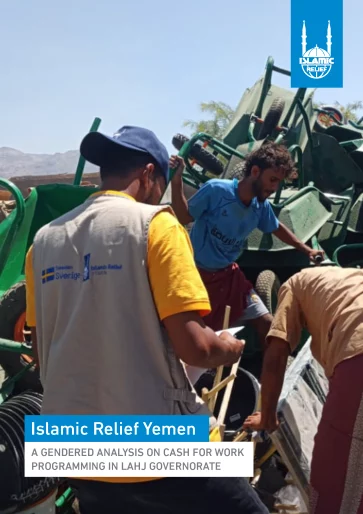
A Gendered Analysis on Cash for Work Programming in Lahj Governorate
Case Study
Cash for Work (CFW) programmes are designed to help the most vulnerable people meet their essential and basic needs. In Yemen, CFW interventions are responding to an ever-growing proportion of the Yemeni population that are in need of humanitarian assistance. Working with communities in the targeted areas of Hudayda and Lahj, the Swedish International Development Cooperation Agency SIDA-funded...
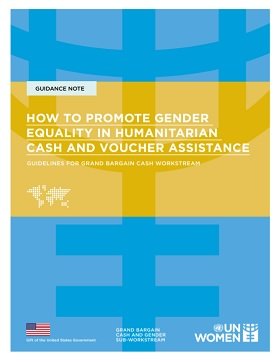
How to Promote Gender Equality in Humanitarian Cash and Voucher Assistance
Guidelines and Tools
The use of cash and voucher assistance (CVA) in humanitarian action is increasing rapidly.
With this rise, there is also growing demand by stakeholders to ensure CVA is more gender-responsive, addressing gender gaps and moving towards greater gender equality.
Gender-responsive CVA, which recognizes existing disparities and addresses the needs of all crisis-affected people equally, has the...
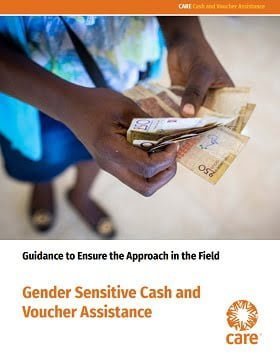
Gender-Sensitive Cash and Voucher Assistance: Guidance to ensure the approach in the field
Guidelines and Tools
This guidance builds on CARE’s ambition-via practice, research, evidence on CVA–and aims to support the application of gender sensitive CVA throughout the project cycle and at the response level. It is divided into two sections: – Part A: ‘What has been learned about gender sensitive CVA?,’ briefly explains the recommendations that came from the research. – Part B: ‘How do we...

Enablers and Gaps: Gender Equality, Gender-Based Violence Response and Mitigation in Cash and Voucher Assistance at Response levels: analysis on three case studies
Report
The Gender and Cash Sub-Workstream identified three case studies that illustrate how Cash Working Groups, GBV Sub-Clusters, gender focal points (e.g. Gender in Humanitarian Action Working groups at country and regional level) and humanitarian partnerships can enable meaningful and wider engagement on gender equity and GBV response in CVA. The case studies all show different aspects of linking...

How to mitigate gender-based violence (GBV) risks in cash and voucher assistance (CVA)
Video
Cash and voucher assistance (CVA) is an important tool to help individuals affected by crises get back on their feet. But just like any other form of assistance, it is vital to ensure that it does not fuel tensions in the household or in the community and that it does not create new risks for women and girls. Fortunately, there are a variety of ways that cash actors can work to mitigate risks...

Inclusive Information Systems for Social Protection: Intentionally Integrating Gender and Disability
Policy paper
Digital information systems serving the social protection sector, and especially social assistance, are increasingly prominent and will continue to be, as is the case within all other sectors. “Why? Because the ability of a country to care for its people and respond to their lifecycle needs depends on its ability to identify those who are in need, enroll them, provide tailored benefits and...
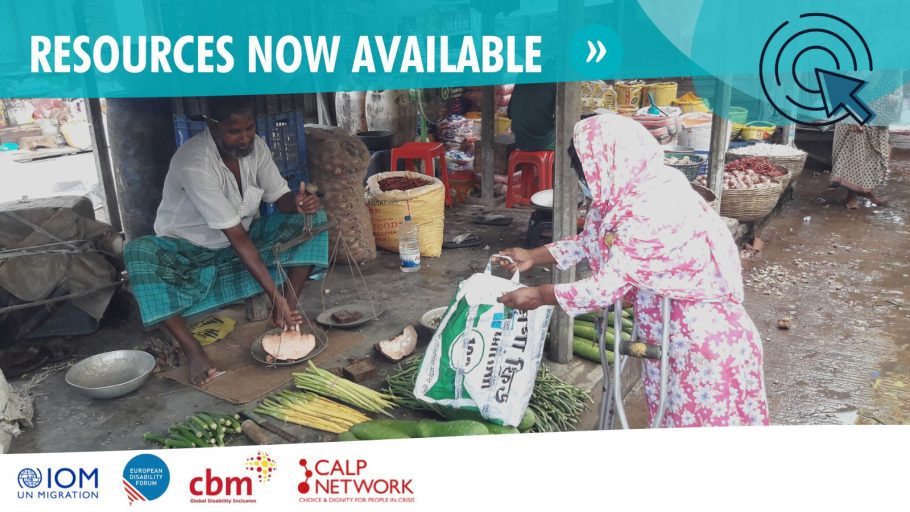
Mainstreaming disability inclusion into humanitarian CVA
Presentation
What is a rights-based approach to disability? How can disability inclusion be mainstreamed to ensure more inclusive and effective CVA humanitarian responses? To answer these key questions, CALP, CBM Global, European Disability Forum and International Organization for Migration (IOM), came together to organize the webinar “Mainstreaming disability inclusion into humanitarian CVA”, with the...
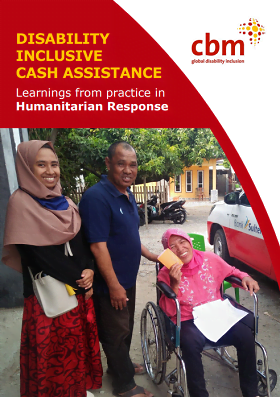
Disability Inclusive Cash Assistance: Learnings from Practice in Humanitarian Response
Guidelines and Tools
This case study collection describes lessons learned from seven inclusive humanitarian cash transfer projects implemented from 2015 – 2020 in Niger, Zimbabwe, Pakistan, Bangladesh, Philippines, and Indonesia, and five ongoing projects from the 2020 Covid-19 pandemic responses. This good practice collection aims to benefit both humanitarian practitioners engaged in Cash Based Interventions...
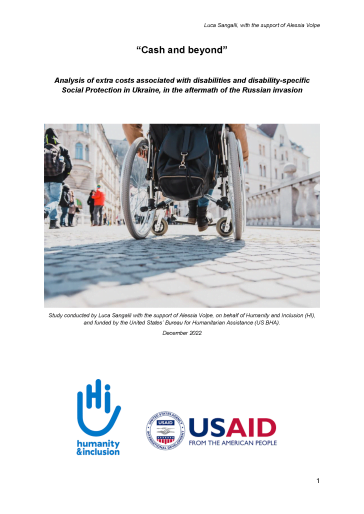
Cash and beyond – Analysis of extra costs associated with disabilities and disability-specific social protection in Ukraine, in the aftermath of the Russian invasion
Report
Following the escalation of the conflict in Ukraine in February 2022 and the consequent humanitarian crisis, the country has experienced active fighting and massive displacement, both within and outside its borders. Persons with disabilities and older persons have been facing particularly harsh effects, especially for those with more severe forms of disabilities, who encountered challenges in...
Thematic lead
Latest
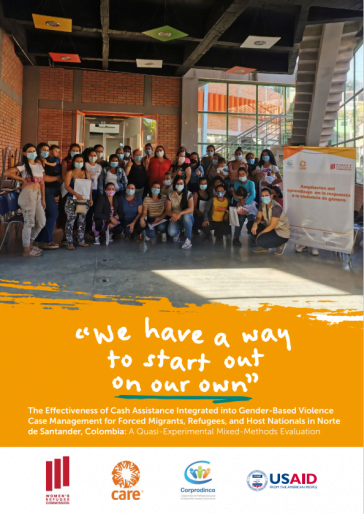
The Effectiveness of Cash Assistance Integrated into Gender-Based Violence Case Management for Forced Migrants, Refugees, and Host Nationals in Norte de Santander, Colombia: A Quasi-Experimental Mixed-Methods Evaluation
Case Study
Gender-based violence (GBV) is a pressing concern for forced migrant and refugee women, girls, and individuals with diverse sexual orientation, gender identity and expression or sex characteristics (SOGIESC). They face exposure to and incidents of GBV before, during, and after a humanitarian crisis....
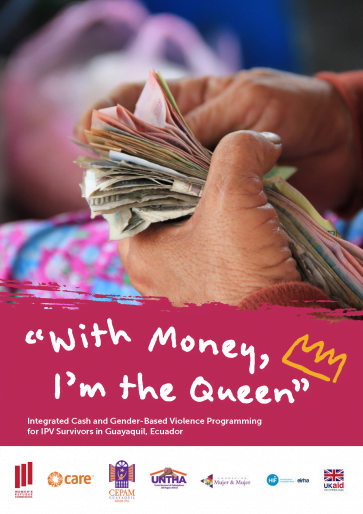
Integrated Cash and Gender-Based Violence Programming for IPV Survivors in Guayaquil, Ecuador
Case Study
Migrant and refugee women and girls are vulnerable to a range of risks before, during, and after humanitarian crises. Intimate partner violence (IPV) is a type of gender-based violence (GBV) and is among the many protection-specific risks they face. As a result of the conflict in Venezuela, an estimated...

Webinar Series: Tackling Gender Based Violence via Cash and Voucher Assistance
Webinar
Join us to learn more about the implementation of cash assistance within GBV responses and how two innovative projects from Ecuador and Colombia approached this challenge. Both events will be conducted in Spanish with simultaneous English translation
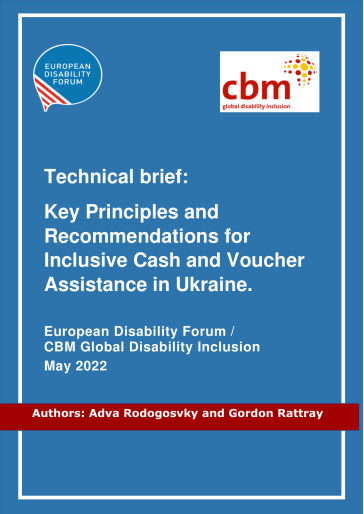
Technical brief: Key Principles and Recommendations for Inclusive Cash and Voucher Assistance in Ukraine.
Guidelines and Tools
A technical brief on inclusive cash and voucher assistance in Ukraine, developed together with the European Disability Forum. The brief is intended to provide general guidance for humanitarian agencies operating in Ukraine on how to implement Disability Inclusive CVA.

Common Barriers to Accessing Inclusive Cash and Vouchers Assistance
Guidelines and Tools
A short list of the most common barriers to ensuring disability inclusive CVA programming

Biweekly Factsheet on the Cash for Protection Taskforce (C4PTT) in Ukraine and Neighbouring Countries
Report
This Fact sheet collates key updates, findings and resources as drawn from Humanitarian Impact situation Reports; minutes from the Cash Working Group (CWG), Protection cluster and sub-cluster/AoR meetings; IOM; UNHCR and other UN sources. It is produced on a bi-weekly basis for protection and cash and...
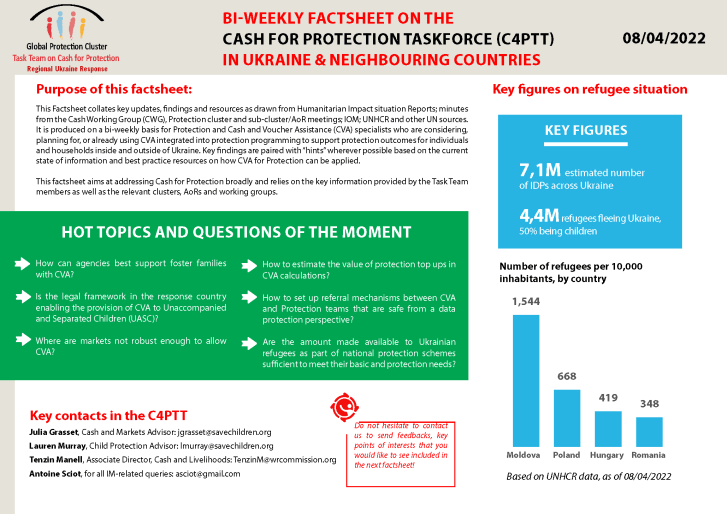
Biweekly Factsheet on the Cash for Protection Taskforce (C4PTT) in Ukraine and Neighbouring Countries
Report
This Factsheet collates key updates, findings and resources as drawn from Humanitarian Impact situation reports; minutes from the Cash Working Group (CWG), Protection cluster and sub-cluster/AoR meetings; IOM; UNHCR and other UN sources. It is produced on a bi-weekly basis for protection and cash and...
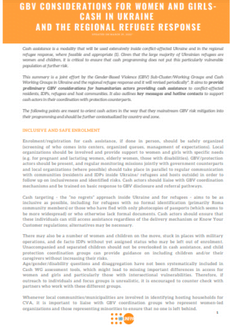
GBV Considerations for Women and Girls- Cash in Ukraine and the Regional Refugee Response- UNFPA 2022
Guidelines and Tools
Cash assistance is a modality that will be used extensively inside conflict-affected Ukraine and in the regional refugee response, where feasible and appropriate (1). Given that the large majority of Ukrainian refugees are women and children, it is critical to ensure that cash programming does not put...

Cash and In-Kind Transfers in Humanitarian Settings: A review of evidence and knowledge gaps
Policy paper
Over the past decade, humanitarian assistance and social protection have increasingly emerged as a policy response tool to support crisis-affected populations facing conflict or natural disasters. This paper presents a descriptive literature review of non-contributory humanitarian assistance interventions...
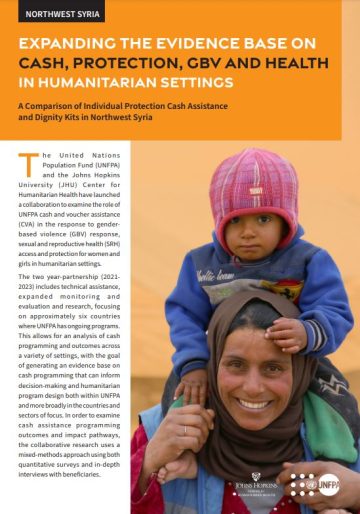
Expanding the Evidence Base on Cash, Protection, GBV and Health in Humanitarian Settings Findings from Northwest Syria: A Comparison of Individual Protection Assistance and Dignity Kits
Case Study
As part of 2021 programming in northwest Syria, UNFPA and its implementing partners provided dignity kits (hygiene and sanitary products) and individual protection assistance (IPA, a one-off unconditional cash transfer) to those in need. The two interventions were intended to provide immediate assistance...

Brief – Expanding the Evidence Base on Cash, Protection, GBV and Health in Humanitarian Settings Findings from Northwest Syria: A Comparison of Individual Protection Assistance and Dignity Kits
Case Study
As part of 2021 programming in northwest Syria, UNFPA and its implementing partners provided dignity kits (hygiene and sanitary products) and individual protection assistance (IPA, a one-off unconditional cash transfer) to those in need. The two interventions were intended to provide immediate assistance...
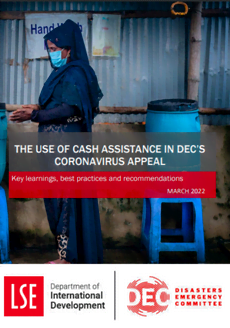
The Use of Cash Assistance in DEC’s Coronavirus Appeal: Key Learning, Best Practices and Recommendations
Report
The purpose of this report is to provide insight into the learnings, future improvements and best practices in cash programming. The 2020 DEC Coronavirus Appeal was analysed to determine the opportunities for collective learning about cash programming. The countries investigated include, Afghanistan,...
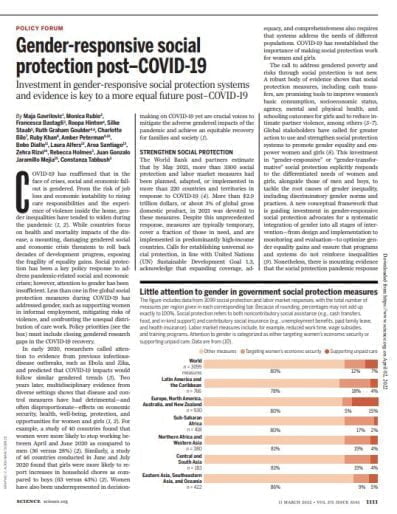
Gender Responsive social protection post- Covid 19
Policy paper
See the publication here Social protection has been a key policy response to address pandemic-related social and economic crises; however, attention to gender has been insufficient. Less than one in five global social protection measures during COVID-19 has addressed gender, such as supporting women in...
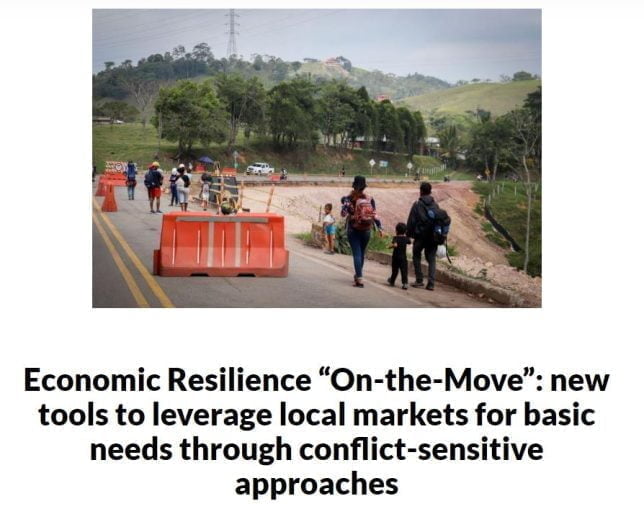
Economic Resilience “On-the-Move” – New Tools to leverage local markets for basic needs through conflict-sensitive approaches
Guidelines and Tools
See the publication here A special look at Cash and Local Markets for Social Cohesion Local market actors affected by (natural) disasters, pandemic lockdowns with movement restrictions and income loss – generally in Fragile Contexts – play a critical role in contributing towards communities’ basic...

#GenderCash: Are we making enough progress?
Blog Post
It’s International Women’s Day 2022! This time four years ago many in the cash and gender communities committed to a six-point plan to improve #GenderCash. But what happened next and what still needs to happen? Karen Peachey CALP’s Director takes a quick look at where we are and also challenges you...

Use of cash and voucher assistance for the wellbeing of adolescent boys and girls in crisis
Report
Adolescents – young people between the ages of 10 and 19 – have specific needs that are distinct from those of younger children and adults. This transitional and developmental period is increasingly seen as an “age of opportunity” globally and in humanitarian settings, because of the significant...
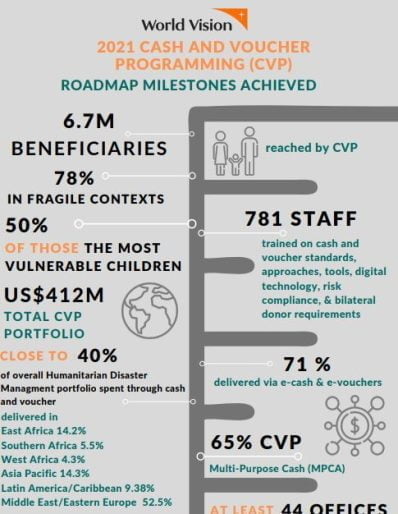
2021 Cash And Voucher Programming (CVP) Roadmap Milestones Achieved
Report
Summary Report of World Vision’s global progress report and milestones (against WV’s global Cash Roadmap Strategy) in Cash Voucher Assistance (Cash Voucher Programming-CVP) facilitated by World Vision in over 44 countries, reaching more than 6.7 Mio vulnerable people (78 % in Fragile Contexts) in...
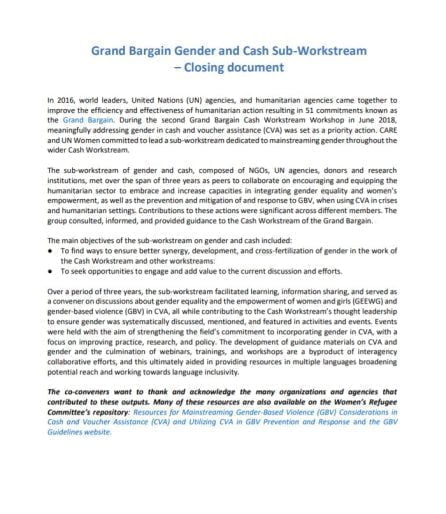
Grand Bargain Gender and Cash Sub-Workstream – Closing document
Guidelines and Tools
The sub-workstream of gender and cash, composed of NGOs, UN agencies, donors and research institutions, met over the span of three years as peers to collaborate on encouraging and equipping the humanitarian sector to embrace and increase capacities in integrating gender equality and women’s empowerment,...

What Does Gender-sensitive Cash and Voucher Assistance Look Like? 2.0: Multi-Country Study
Report
In 2019, CARE commissioned the study “What Does Gender sensitive Cash and Voucher Assistance Look Like?” to evaluate the extent to which CARE’s programming with cash and voucher assistance (CVA) met the strategic intent. It guided the agency-wide definition and design of subsequent guidelines on...

Pathways from CVA to long term financial inclusion: A framework for success
Blog Post
CVA programs can provide a springboard to financial inclusion. But spotting the right opportunity, and good programme design, are key. GSMA and Mercy Corps share a simple tool to understand which contexts offer the best pathways from CVA to financial inclusion.



